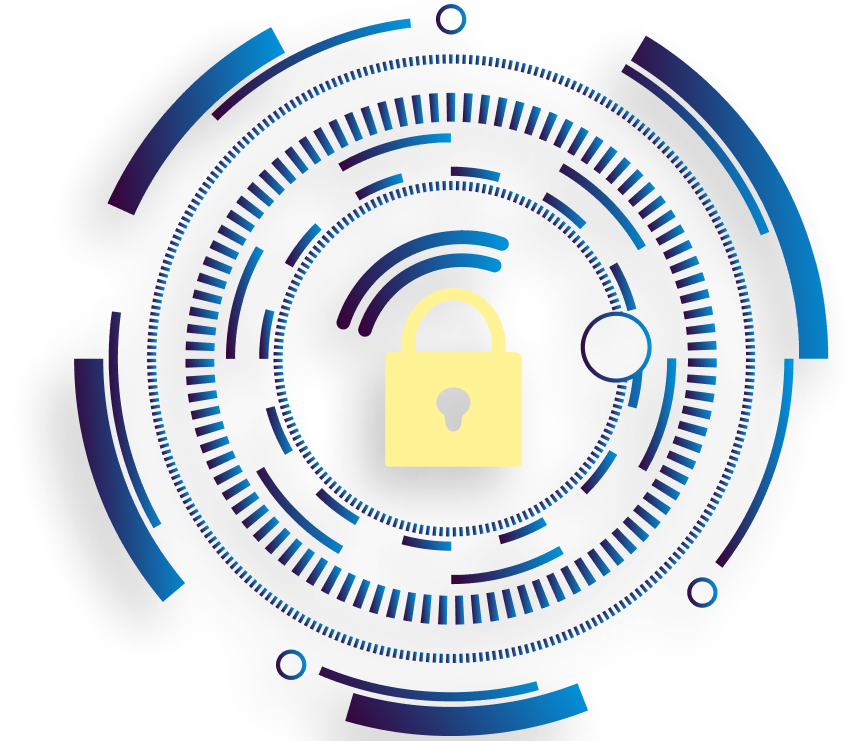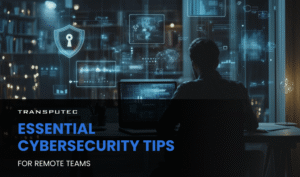Written by SONNY SEHGAL | CEO
Hybrid working has presented new challenges for organisations in terms of network security. In today’s digital world, network security has never been more crucial for businesses. This is especially true in the era of the hybrid office. While hybrid working offers significant benefits for organisations and their employees, it also brings new cybersecurity threats and risks that need to be addressed.
With cyber threats evolving rapidly, businesses must stay ahead by implementing robust cybersecurity measures. Understanding how to secure a business network is paramount for any organisation. In this blog, we’ll indulge in essential strategies and tools to secure a business network effectively, backed by empirical data and expert insights.
Why Employee Training is Crucial for CyberSecurity?
Transputec is a leading provider of Cyber Security Services, offering a comprehensive suite of solutions to safeguard businesses from evolving threats. Specialising in proactive defence measures, Transputec delivers tailored cyber security services strategies to meet diverse needs. Their services encompass threat detection, vulnerability assessments, and risk management.
Transputec employs cutting-edge technologies to fortify cyber security services defences, including advanced threat intelligence and machine learning algorithms
Why Securing Your Business Network is Crucial?
Securing a business network is crucial for several reasons. First and foremost, it protects your sensitive data, including customer information, financial records, and intellectual property, from unauthorised access or theft. Data breaches can have severe consequences, such as regulatory fines, legal liabilities, and loss of customer trust. According to the 2022 Cost of a Data Breach Report by IBM, the average cost of a data breach in 2022 was $4.35 million globally, and $9.44 million in the United States. The report also found that the healthcare industry had the highest average cost of a data breach at $10.1 million, followed by the financial industry at $5.97 million.
Additionally, a secure network ensures business continuity by preventing disruptions caused by cyber attacks, malware infections, or system failures. Downtime can result in significant financial losses and damage to your reputation.
Furthermore, network security is essential for maintaining compliance with industry regulations and standards, such as the General Data Protection Regulation (GDPR), the Health Insurance Portability and Accountability Act (HIPAA), and the Payment Card Industry Data Security Standard (PCI DSS).
“Before we explore how to secure a business network, it’s vital to comprehend the stakes involved. According to Cybersecurity Ventures, cybercrime damages are projected to cost the world $10.5 trillion annually by 2025. This staggering figure underscores the importance of proactive cybersecurity measures."
Tips on How to Secure a Business Network
Securing a business network is essential to protect sensitive data, maintain business continuity, and safeguard against cyber threats. Here are some detailed tips on how to secure a business network effectively:
1. Implement a Firewall: Set up a firewall to control and monitor incoming and outgoing network traffic, blocking unauthorised access attempts and potential threats.
2. Use Virtual Private Networks (VPNs): Deploy VPNs to create secure, encrypted connections for remote employees and protect data transmissions over public networks.
3. Enable Multi-Factor Authentication (MFA): Require multiple forms of authentication, such as passwords, biometrics, or one-time codes, to verify user identities and prevent unauthorised access.
4. Keep Software Updated: Regularly update software, operating systems, and firmware to patch vulnerabilities and protect against known threats.
5. Conduct Security Awareness Training: Educate employees on cybersecurity best practices, such as recognising phishing attempts, creating strong passwords, and handling sensitive data securely.
6. Use Endpoint Protection: Deploy endpoint protection solutions to secure devices like laptops and desktops from malware, ransomware, and other cyber threats.
7. Implement Access Controls: Enforce strict access management policies and the principle of least privilege to limit user access to only necessary resources.
8. Encrypt Sensitive Data: Use data encryption to protect confidential information at rest and in transit from unauthorised access or interception.
9. Perform Regular Audits and Monitoring: Conduct periodic network audits to identify vulnerabilities, and continuously monitor user activity for suspicious behaviour.
10. Utilise Next-Generation Firewalls: Deploy next-generation firewalls with advanced intrusion prevention, application control, and SSL/TLS inspection for enhanced network security.
Learn more about cybersecurity solutions with Transputec
Connect us today for our free consultation!
Essential Tools for Securing a Business Network
To implement the layered security approach effectively, you’ll need to leverage various tools and technologies. Here are some essential tools to consider:
1. Firewalls: Firewalls act as a barrier between your network and the internet, controlling incoming and outgoing traffic based on predefined rules. They can be hardware-based or software-based, and they are essential for preventing unauthorized access and protecting against cyber threats.
2. Intrusion Detection/Prevention Systems (IDS/IPS): IDS/IPS solutions monitor network traffic and system activities for potential threats, alerting you to suspicious behavior and, in the case of IPS, actively blocking malicious activities.
3. Virtual Private Networks (VPNs): VPNs create secure, encrypted connections between remote users or sites and your business network, ensuring data privacy and protecting against eavesdropping and man-in-the-middle attacks.
4. Antivirus and Endpoint Protection Solutions: Antivirus software and endpoint protection solutions are essential for detecting and removing malware, viruses, and other malicious code from your devices and systems.
5. Multi-Factor Authentication (MFA): MFA adds an extra layer of security by requiring users to provide multiple forms of authentication, such as a password and a one-time code or biometric data, making it much harder for unauthorised individuals to gain access.
6. Data Encryption: Encryption tools protect sensitive data by converting it into an unreadable format, ensuring that even if the data is intercepted, it remains secure and inaccessible to unauthorised parties.
7. Security Information and Event Management (SIEM): SIEM solutions collect and analyse security-related data from various sources, such as firewalls, IDS/IPS, and endpoint protection solutions, providing real-time visibility into potential threats and enabling rapid incident response.
8. Vulnerability Management and Patch Management: Regularly scanning your systems for vulnerabilities and applying security patches and updates is crucial to mitigating known risks and closing potential entry points for cyber threats.
Partner with Transputec for Expert Network Security Solutions
In an era where cyber threats are becoming increasingly sophisticated and pervasive, securing your business network is more critical than ever. This is where Transputec comes in. As a leading provider of cybersecurity solutions, Transputec offers expert guidance and state-of-the-art tools to ensure your network is robust, resilient, and secure.
1. Industry Expertise: With decades of experience in the cybersecurity field, Transputec has developed a deep understanding of the various challenges and threats that businesses face. Our team of experts is well-versed in the latest security trends, technologies, and best practices, ensuring that your network is protected against current and emerging threats.
2. Comprehensive Security Solutions: Transputec provides a wide range of cybersecurity services tailored to meet the unique needs of your organisation. Our solutions include:
- Network Security Assessments: We conduct thorough assessments to identify vulnerabilities and recommend effective measures to strengthen your network.
- Advanced Threat Protection: Utilising cutting-edge technologies, we offer real-time protection against malware, ransomware, and other sophisticated threats.
- Firewall and IDS/IPS Management: We deploy and manage firewalls, Intrusion Detection Systems (IDS), and Intrusion Prevention Systems (IPS) to safeguard your network from unauthorised access and malicious activities.
- Endpoint Security: Our endpoint protection solutions ensure that all devices connected to your network are secure, minimising the risk of breaches from vulnerable endpoints.
- Data Encryption and Protection: We implement robust encryption protocols to protect your sensitive data, both at rest and in transit.
3. Proactive Monitoring and Incident Response: At Transputec, we believe that proactive monitoring is key to maintaining network security. Our advanced monitoring tools continuously analyse your network for suspicious activities, allowing us to detect and mitigate potential threats before they cause significant damage. In the event of a security incident, our rapid response team is ready to act swiftly to contain the threat and minimise its impact.
4. Customised Cybersecurity Training: Human error is one of the leading causes of security breaches. To address this, Transputec offers customised cybersecurity training programs designed to educate your employees on best practices, phishing scams, and safe internet habits. By empowering your team with the knowledge they need, we help create a culture of security within your organisation.
5. Regulatory Compliance: Navigating the complex landscape of regulatory compliance can be challenging. Transputec assists you in meeting the necessary requirements, such as GDPR, HIPAA, and PCI-DSS, ensuring that your business adheres to industry standards and avoids costly penalties.
Conclusion
Securing a business network is a complex and ongoing process that requires a multi-layered approach, the right tools and technologies, and adherence to best practices. By implementing the strategies and solutions outlined in this guide, you can significantly enhance the security of your network and protect your business from the ever-increasing threat of cyber attacks.
Remember, cybersecurity is not a one-time effort; it’s an ongoing journey that requires continuous monitoring, updating, and adaptation to stay ahead of evolving threats. Regularly assess your security posture, stay informed about the latest trends and vulnerabilities, and invest in employee training to cultivate a strong security culture within your organisation.
If you’re looking for expert guidance and support in securing your business network, Transputec is here to help. Our team of cybersecurity professionals has extensive experience in implementing robust security solutions tailored to the unique needs of businesses across various industries. Contact us today to schedule a consultation and take the first step towards fortifying your network against cyber threats.

Secure Your Business!
Ready to protect your organisation from cyber threat?
Schedule a call with our team of experts at Transputec.
FAQs
What is the first step in securing a business network?
The first step is conducting a comprehensive network assessment to identify all assets and potential vulnerabilities. This foundational step helps in formulating an effective security strategy.
How does multi-factor authentication enhance network security?
Multi-factor authentication (MFA) adds an extra layer of security by requiring users to provide two or more verification factors. This reduces the risk of unauthorised access due to compromised credentials.
Why is regular software updating important for network security?
Regular software updates and patches fix known vulnerabilities that cybercriminals could exploit. Keeping software up-to-date is crucial to protect against new and emerging threats.
How can encryption protect sensitive data?
Encryption converts data into a coded format, ensuring that even if intercepted, the data remains unreadable without the decryption key. This is vital for protecting sensitive information.
What role does employee education play in network security?
Employees are often the first line of defence against cyber threats. Regular training on cybersecurity best practices helps in preventing human errors that could lead to security breaches.







